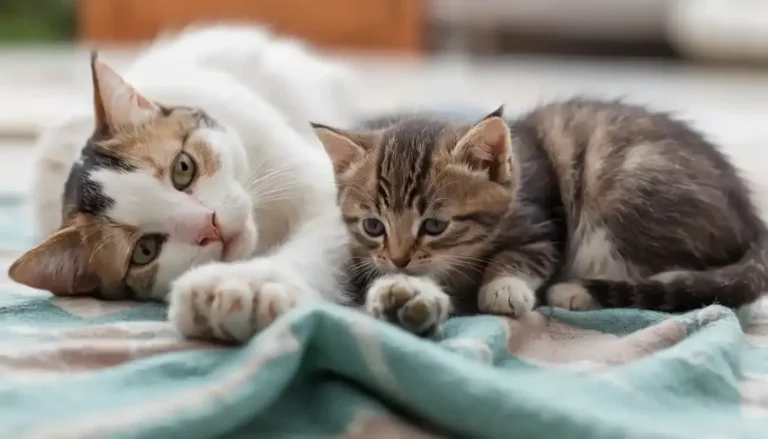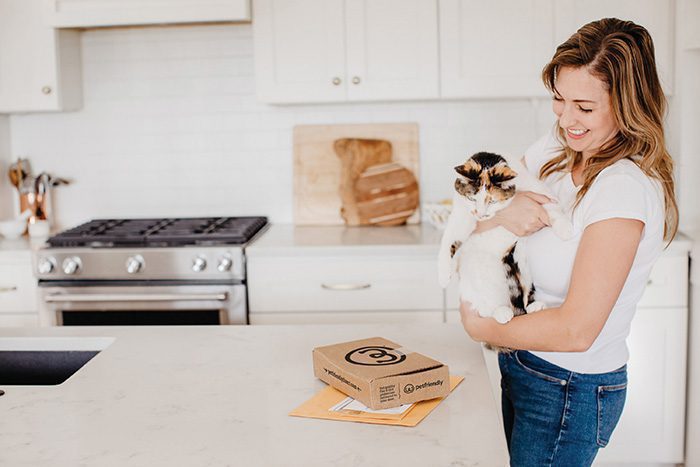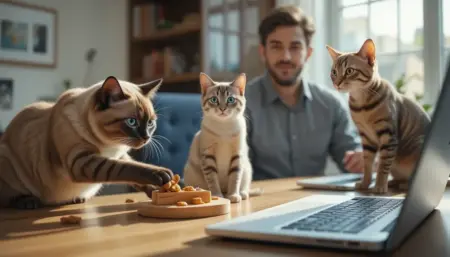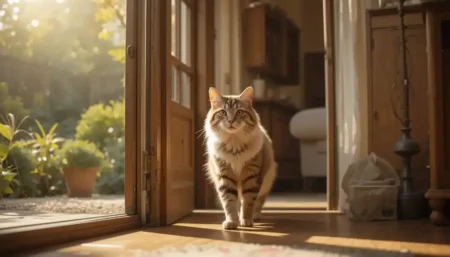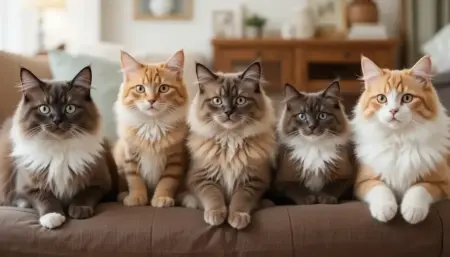How to introduce a new kitten to an older cat can feel daunting, but the right plan turns a potential clash into a calm, lasting friendship. In the first few minutes, you’ll learn the key steps—scent swapping, visual contact, and supervised play—that set the tone for a peaceful multi‑cat home.
Follow this proven roadmap and watch curiosity become companionship.
Why a Calm Multi‑Cat Household Matters
A relaxed home benefits both felines and people. When you master how to introduce a new kitten to an older cat, you create a space where stress is low, bonds are strong, and everyday life feels smoother.
- Reduced stress for both pets – Predictable routines keep cortisol levels down.
- Long‑lasting bond – Proper introductions can evolve into playmates or gentle co‑parents.
- Peace of mind for you – Fewer fights mean fewer vet visits and more enjoyable cuddle time.
Tip: A harmonious multi‑cat household also protects your furniture—content cats are less likely to scratch out of anxiety.
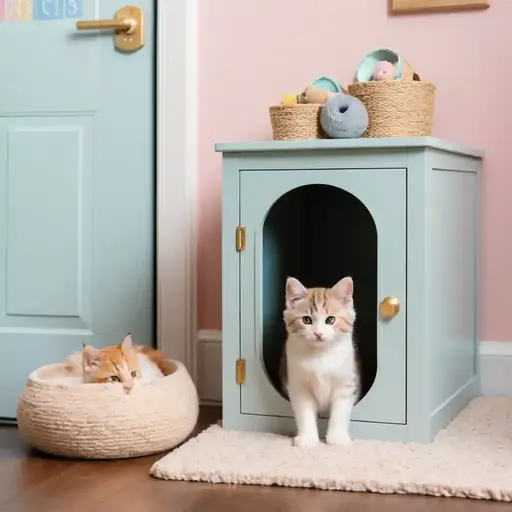
Understanding Feline Behavior During Introductions
Before you learn how to introduce a new kitten to an older cat, it helps to decode the language cats use. Their communication is mostly scent‑based and body‑language driven.
Territorial Instincts
- Cats mark territory with scent glands on their cheeks, paws, and tails.
- A resident cat’s map is suddenly altered when a kitten arrives, prompting vigilance.
Decoding Feline Communication
| Signal | What It Means | What You Should Do |
|---|---|---|
| Slow blink | Trust & relaxation | Reward with a treat |
| Flattened ears | Defensive alert | Give space, back off |
| Tail puffed up | Fear or aggression | End the interaction calmly |
| Light “chatter” | Predatory excitement (often from kittens) | Redirect with a toy |
The Psychology Behind the Struggle
Cats are solitary by evolution, so introducing a new kitten to an older cat requires patience. Forced proximity can trigger the fight‑or‑flight response, prolonging stress.
- Kittens are naturally exuberant; they may overwhelm a senior cat with rapid pounces.
- Older cats use swats and hisses to set boundaries, not to express hatred.
Recognizing these instincts lets you intervene with empathy rather than frustration.
How to Introduce a New Kitten to an Older Cat: Preparing Your Home
The preparation stage is the foundation of a successful integration. Think of it as setting the stage for a calm first meeting.
- Create a safe room for the kitten
- Include a litter box, food & water dishes, a cozy bed, and a high perch.
- A cat tree or shelves give the kitten an escape route if the older cat’s scent feels threatening.
2. Set up scent‑swap stations
- Swap a blanket or favorite toy between the two rooms each day.
- Place each item for at least 12 hours to allow the scents to fully transfer.
- 3. Provide abundant resources
- Follow the “one plus one” rule: one litter box plus an extra for each cat.
- Duplicate feeding stations and scratching posts in separate zones.
4. Deploy calming aids
- Plug in a Feliway diffuser in the hallway linking both rooms.
- Consider vet-approved supplements, such as L-theanine, or calming treats.
- 5. Confirm health status
- Ensure the older cat is up‑to‑date on vaccinations and free of parasites.
- A quick wellness exam for the newcomer prevents hidden illnesses from sparking conflicts.
Pre‑Arrival Checklist
| Item | Completed? |
|---|---|
| Safe room fully kitten‑proofed | ☐ |
| Scent‑swap blankets ready | ☐ |
| Extra litter boxes installed | ☐ |
| Feliway diffuser operating | ☐ |
| Vet records reviewed for both cats | ☐ |
By checking each box, you guarantee the environment is neutral, resource‑rich, and stress‑reduced—exactly what is required to introduce a new kitten to an older cat’s demands.
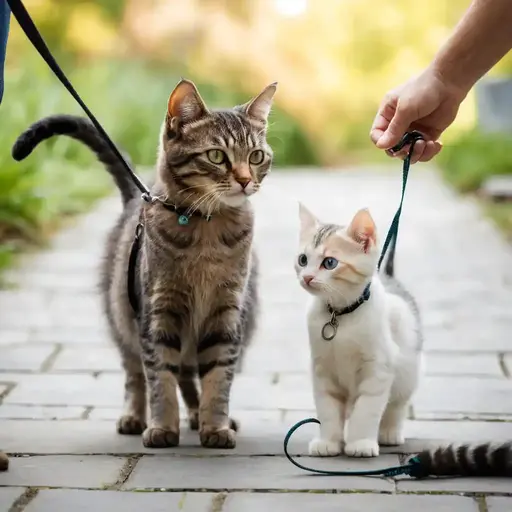
The First Few Days: Keeping Them Separate
During the initial 3–5 days, the goal is visibility without contact. This phase builds curiosity while respecting each cat’s territory.
Step‑by‑Step Separation Plan
- Day 1–3: Scent Swapping Only
- Exchange the kitten’s and the senior cat’s blankets twice daily.
- Observe each cat’s reaction—curiosity is a good sign, hissing for more than a minute signals caution.
2. Day 4–5: Auditory Association
- Feed both cats on opposite sides of the closed door; the pleasant sound of mealtime creates a positive link.
- Play soft music near the safe room to mask sudden noises that could startle either cat.
3. Day 6: Controlled Door Peek
- Slightly crack the door (or use a baby gate without the latch) and watch for body language.
- If either cat becomes overly tense, revert to scent swapping for another 24 hours.
Body‑Language Cheat Sheet
- Relaxed: Tail low and swaying, ears forward, whiskers neutral.
- Tense: Tail puffed, ears flattened, pupils dilated, body crouched.
When you notice tense signals, pause the progression and reinforce calm with treats and soothing words.
Visual Introduction – First Sight
Now that you understand how to introduce a new kitten to an older cat through scent and sound, it’s time for the first visual contact. This step should feel like a brief, friendly “hello” from a distance.
Setting Up a Safe Visual Barrier
- Use a baby gate, screen door, or a sturdy cardboard box with a small slit.
- Position each cat’s food bowls on opposite sides of the barrier to associate the sight with a rewarding activity.
Procedure
- Start with 5‑minute sessions
- Keep treats handy. Reward each cat for remaining calm (no swatting, no prolonged hissing).
2. Watch for positive cues.
- Slow blinking, gentle tail flicks, or a slight approach toward the barrier are encouraging.
3. Gradually extend the time
- Increase each session by 2–3 minutes as long as stress signals stay low.
When to Slow Down
If the older cat spends more than a minute staring intently, ears pinned, or begins to pace, pause the visual contact. Return to scent swapping for another day before trying again.
Visual Introduction Checklist
- Barrier securely installed
- Treats at each cat’s side
- Calm background music is playing
- Session timer set (5–10 min)
By following this structured visual intro, you answer the most common question about how to introduce a new kitten to an older cat: “When do they see each other?” The answer is: gradually, and only when both feel safe.
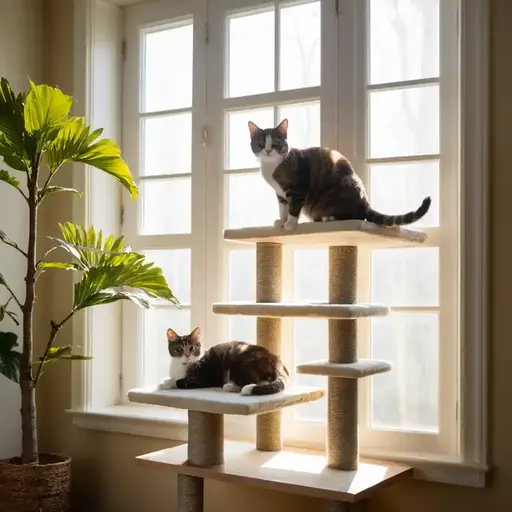
Supervised Face‑to‑Face Meetings
The moment you allow the kitten and senior cat to meet without a barrier is the most exciting—and the most delicate—part of how to introduce a new kitten to an older cat. Think of it as a short, scripted play where you control the stage and cues.
Preparing the Meeting Space
- Choose a neutral room that neither cat “owns” (e.g., a living room with no cat beds).
- Remove high‑value items that could become contested (e.g., favorite toys, premium food).
- Place a tall cat tree or shelving unit that offers an escape route for either cat.
Conducting the First Meeting
- Leash or harness the kitten
- A light harness gives you control without hurting the kitten’s spirit.
2. Keep the session to 5–10 minutes
- Short, positive interactions beat long, stressful ones.
3. Reward calm behavior instantly
- Offer a treat or gentle praise when the older cat sniffs without swatting, and when the kitten backs off after a curious approach.
Managing Energy
- Tire the kitten first: 10 minutes of solo play with a wand toy reduces the chance of over‑excitement.
- Monitor the senior cat’s stamina: Older cats may tire quickly; let them retreat to a perch if they seem overstimulated.
Red Flag Protocol
| Red Flag | Immediate Action |
|---|---|
| Persistent hissing > 30 seconds | End the meeting, provide a calming treat, and go back a step |
| Swatting with claws exposed | End the meeting, provide a calming treat, go back a step |
| One cat refuses to eat or use the litter box for > 24 hrs | Schedule a vet check, pause introductions |
Supervised Meeting Checklist
- Harness on the kitten (optional for the older cat)
- High‑value treats for both cats
- Escape routes (cat tree, shelves) are ready
- Exit plan (door or carrier) within arm’s reach
These steps answer the core of how to introduce a new kitten to an older cat during face‑to‑face contact—how to keep the encounter positive, brief, and under control.
Full Integration – Allowing Unsupervised Time
When calm body language becomes the norm for at least a week, you can start granting unsupervised access. This final stage of how to introduce a new kitten to an older cat is where the household truly becomes a shared space.
Signs That Both Cats Are Ready
- No hissing or swatting for 7–10 consecutive days.
- Both cats eat, drink, and use the litter box normally in each other’s presence.
- They may even nap in the same room, though not necessarily together.
Resource Management for Ongoing Harmony
| Resource | Recommended Arrangement |
|---|---|
| Food bowls | Separate corners, at least 3 ft apart |
| Water stations | Multiple locations to prevent guarding |
| Litter boxes | One per cat plus one extra, placed in low‑traffic areas |
| Sleeping spots | Individual high perches + a shared sunny window ledge (optional) |
Vertical Territories – The Power of Height
- Install wall‑mounted cat shelves or a multi‑level cat tree.
- Vertical escape routes let the senior cat retreat without feeling cornered, and give the kitten a place to climb and explore safely.
Daily Routine for Long‑Term Bonding
- Morning play session (10 min): Use a wand toy to involve both cats, encouraging cooperative pouncing.
- Mid‑day resource check: Ensure food, water, and litter boxes are clean and adequately spaced.
- Evening cuddle time: Offer a lap or extra blanket near the main sleeping area; let the cats approach on their terms.
Integration Checklist
- Separate feeding stations daily
- Litter boxes are cleaned twice a day
- At least one vertical perch in each main room
- Weekly group play session scheduled
Following this roadmap satisfies the ultimate question of how to introduce a new kitten to an older cat: when can they truly coexist without supervision?
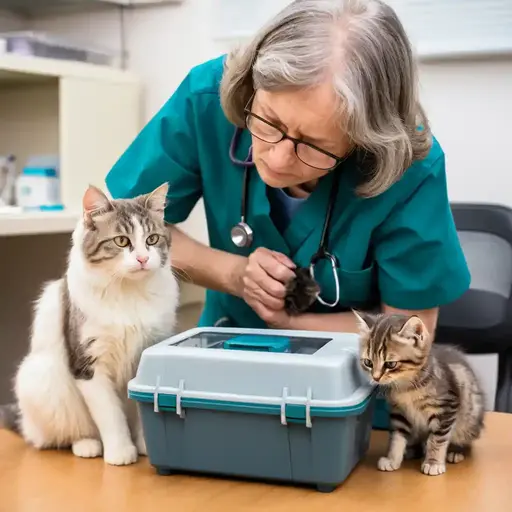
Troubleshooting Common Issues
Even a well‑planned introduction can hit snags. Below are proven fixes for the most frequent setbacks when learning how to introduce a new kitten to an older cat.
Persistent Hissing
- Re‑evaluate the timeline: Drop back to scent swapping for 48 hours.
- Increase pheromone support: Add a second Feliway diffuser in the hallway.
- Use calming music: Soft classical or “cat‑calm” playlists lower stress hormones.
Kitten Play Aggression
- Redirect with toys: Offer a crinkly ball or puzzle feeder before the cats meet.
- Teach “break” cues: Use a clicker or verbal cue (“stop”) followed by a treat when the kitten pauses.
- Separate high‑energy moments: Schedule a solo play session for the kitten right before any joint time.
Stress‑Related Health Changes
| Symptom | Possible Cause | Action |
|---|---|---|
| Reduced appetite | Anxiety or underlying illness | Vet visit to rule out medical issues |
| Excessive grooming / hair loss | Stress‑induced psychogenic alopecia | Increase environmental enrichment, add calming aids |
| Litter box avoidance | Territorial marking or fear | Add an extra litter box, keep doors open for visual reassurance |
If any symptom persists for more than three days, consult your veterinarian.
Special Considerations
- Declawed senior cats: Use soft, plush toys; avoid rough play that could cause pain.
- Arthritic or senior cats: Provide extra low‑height resting spots and avoid high‑energy kitten play near them.
- Blind or deaf cats: Rely heavily on scent and tactile cues; keep introductions slower and use gentle hand‑guides.
Troubleshooting Checklist
- Return to the scent‑swap phase if aggression spikes
- Add an extra Feliway diffuser + calming music
- Schedule a health check if stress signs appear > 72 hrs
By treating each issue as a learning moment in how to introduce a new kitten to an older cat, you keep the overall process on track.
Long‑Term Harmony and Bonding
Now that the cats are cohabiting, the work of how to introduce a new kitten to an older cat shifts from “introduction” to “relationship building.”
Daily Practices for Strengthening the Bond
- Joint interactive play – Use wand toys that encourage both cats to chase the same feather.
- Co‑feeding ritual – Place bowls side‑by‑side once a week for a “social meal.”
- Rotate toys and perches – Keep the environment fresh, reducing boredom and territorial disputes.
Monitoring for Subtle Tensions
- Resource guarding: Watch for a cat lingering near the food bowl after the other finishes.
- Passive aggression: Blocking doorways or “accidental” swats can signal underlying stress.
If you notice the early signs, intervene with a quick scent swap or a short supervised play session.
Real‑World Success Story
Emma’s 9‑year‑old tuxedo, Leo, initially hissed at the 4‑month‑old tabby, Lila, for two weeks. By following the step‑by‑step plan for how to introduce a new kitten to an older cat, she added a vertical shelf near Leo’s favorite perch and performed daily 10‑minute joint play. Within three weeks, Leo was calmly watching Lila’s “zoomies” from his shelf, and they now nap side‑by‑side on the couch.
Periodic Household Audit
| Frequency | Task |
|---|---|
| Weekly | Check that feeding stations remain spaced, inspect vertical perches for stability. |
| Monthly | Review any changes in behavior, and schedule a vet wellness check for both cats. |
| Quarterly | Check that feeding stations remain spaced, and inspect vertical perches for stability. |
Maintaining these habits ensures the relationship you cultivated while learning how to introduce a new kitten to an older cat stays healthy and enjoyable.
FAQs
How long does it usually take for two cats to get along?
Most cats show noticeable improvement within 2–4 weeks, but full harmony can take several months. Patience is key—if progress stalls, revisit scent swapping or add calming aids.
Can I use a baby gate instead of a crate for the visual introduction?
Yes. A sturdy baby gate or mesh screen works well as long as it prevents direct contact. Keep the gate low enough that both cats can see each other without feeling trapped.
What if my older cat never shows interest in the kitten?
Indifference is normal and often means the cats will coexist peacefully. Continue providing separate resources and occasional joint play; you may never see them cuddling, but they’ll respect each other’s space.
Is it safe to let a kitten roam the house before the older cat is ready?
No. Allowing unrestricted access can trigger territorial aggression. Keep the kitten confined to a safe room until the senior cat consistently shows calm behavior during visual and supervised meetings.
Should I give my cats medication to reduce stress?
Medication should only be used under veterinary guidance. Over‑the‑counter calming treats or pheromone diffusers are safer first‑line options when learning how to introduce a new kitten to an older cat.
Conclusion
Mastering how to introduce a new kitten to an older cat involves a patient, step‑by‑step plan: prepare a neutral environment, swap scents, allow brief visual contact, supervise short face‑to‑face meetings, and finally grant unsupervised freedom once calm behavior is consistent.
By keeping resources abundant, providing vertical escape routes, and troubleshooting issues early, you’ll foster a peaceful, lasting bond. Start today with a scent‑swap blanket, and watch curiosity blossom into companionship.
Ready to begin? Grab a soft blanket, set up a quiet room, and start the scent exchange. Your older cat’s peace and your new kitten’s confidence depend on that first gentle sniff.


